Iphigenia. My book of the month for women. Esp-Eng
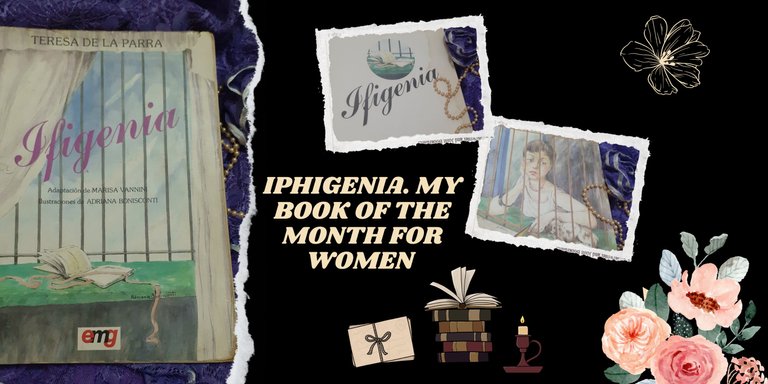
Precisely in this month of women I have dedicated a very special book for me because it is by a Venezuelan writer, Teresa de la Parra, her first novel Ifigenia which has hooked me.
Since last year I have with me a beautiful collection of books of this woman writer, who has captivated me with many of her works and among these is this novel that makes us live from the essence of her fresh and subtle pen, the life of this young woman through her diary.
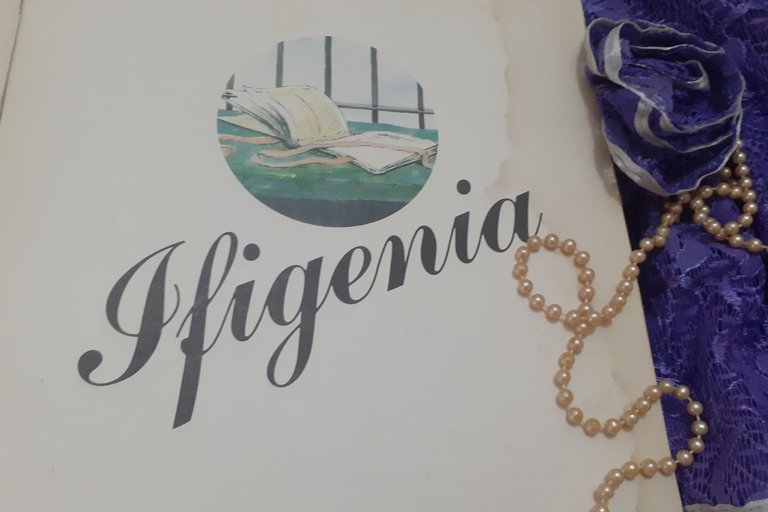
This young girl named Iphigenia lets us know in a sincere way how her life was really annoyed by the social and family rules that prevented her from really being, for fear of repudiation and family banishment for not fulfilling her desires of being a young girl of high society.
She tells us about the brutal change she suffered when she returned from Paris where she used to live full and free, spending her last pennies on garnet necklaces, pearls, perfume packages, shoes, dresses and hats, as well as solitary walks through the beautiful corridors and boulevards of that romantic city.
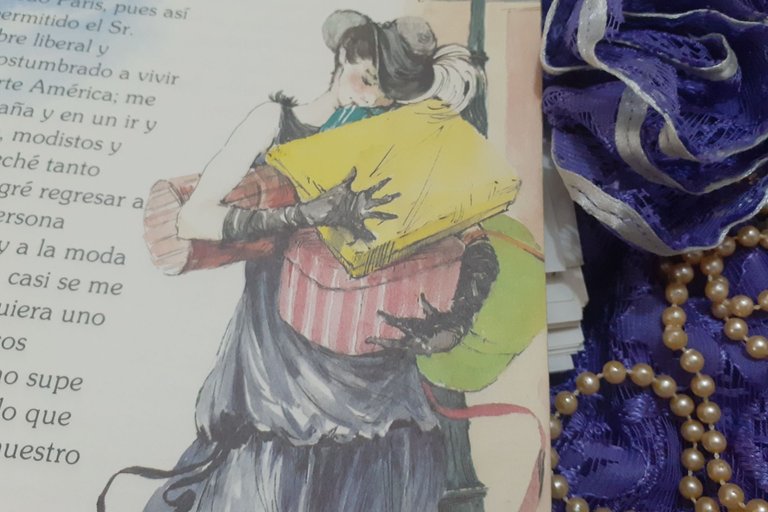
To live the infinite annoyance of confinement and the daily glances through the windows of those old houses, where she only used to prepare sweets, water the flowers of that lush garden and embroider, tasks that did not enliven or fill her life, nor each of her days.
The truth is that I read it in one day, but what I enjoyed the most was to feel its pages, besides the particular smell of its yellowish pages that express antiquity in the book and the detailed illustrations that transport us to each scene presented by the writer.
While reading each page we are detailing apart from all the daily and familiar of the time, the situation that women lived in front of the society of the early twentieth century, where the strict social norms did not allow them to express their ideas and less choose their destiny, they did not decide what to study, what to do or who to marry.
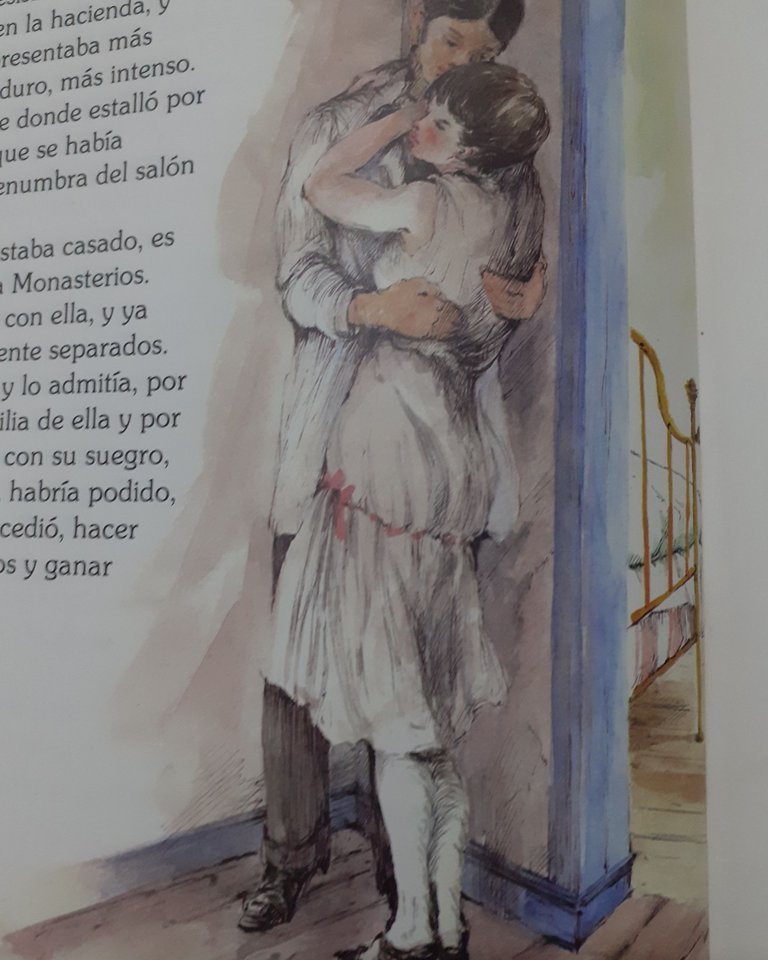
Ifigenia lives her life with her direct relatives since she is orphan of parents, she knew love through Gabriel and some of the world through that big window, perhaps with the hope of getting a boyfriend.
Her great fortune and inheritance had passed into the direct hands of her uncle Eduardo, which forced her to live indoors in that old house, where she lived with her grandmother and the four maids, among them her confidant, the black woman Gregoria.
Living love from a distance destroyed Ifigenia's illusions, after knowing that her beloved Gabriel had become engaged, her life in that Caracas had been frustrated, without hope of love, freedom and happiness.
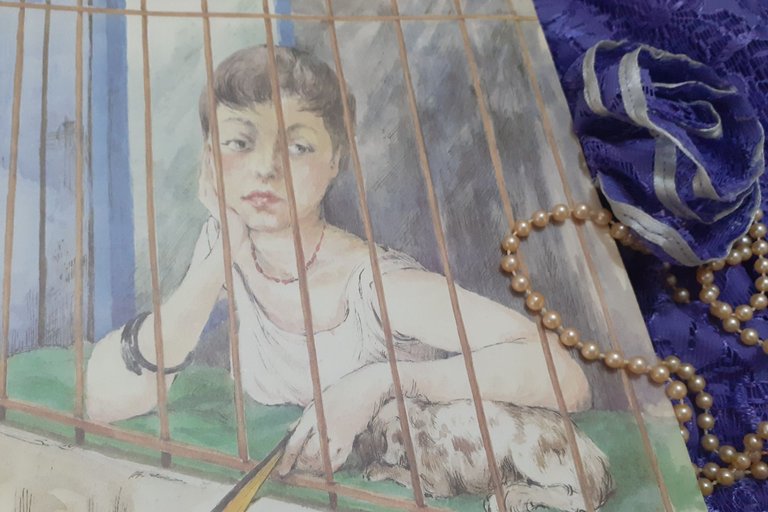
That window was for this vivacious young woman an exhibition showcase, it was to enjoy the scenery and wait for the best buyer, in this case an older, professional man who wanted her to be a refined, blushing, shy, pretty, distinguished and well educated young woman, everything a woman of that time who belongs to the best of Caracas should be.
She has a boyfriend without wanting to, a man who cares for her, sends flowers and luxurious chests full of exquisite sweets of the best brands, takes care of her and besides that has forbidden her to wear low-cut dresses, to wear makeup and cut her hair, to read her romantic novels, in short, to stop being a woman who knew how to be a high school girl.
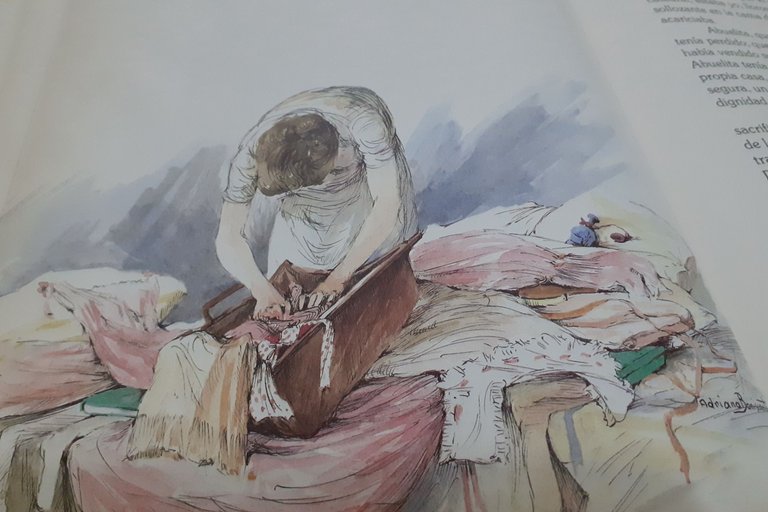
In the end the first loves return and that lost kiss had been consummated, even when her first love was already married by obligation without any affinity and where both had realized that money had no weight in front of love and happiness.
This dragged them to live an adventure full of promises and a flight of love that in the end, was frustrated by the demand of being married, mistress of her own house, next to a man who offered her a secure life, a respectable family name, a patrimony, a dignity and a family.
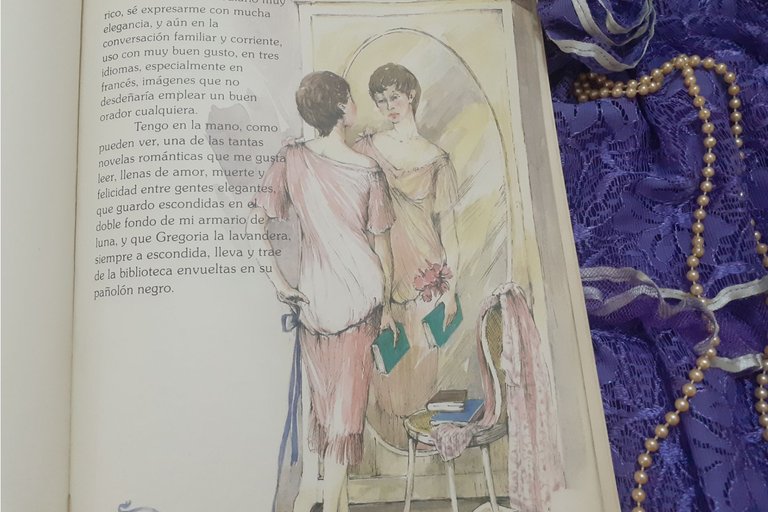
That respectability called society, family, honor, religion, morality, duty, principles and conventions of a sacrifice that has left Iphigenia immobile in time, with 18 years of life, elegant, beautiful, educated, cultured in that demanding society, where she only needed a man to be represented, maintained and controlled.
Iphigenia can not be or do what she wants and despite everything she has tried not to lose her essence as a woman, I love this story has family drama, social and romantic, there are no scenes of high tone, everything evokes the era.
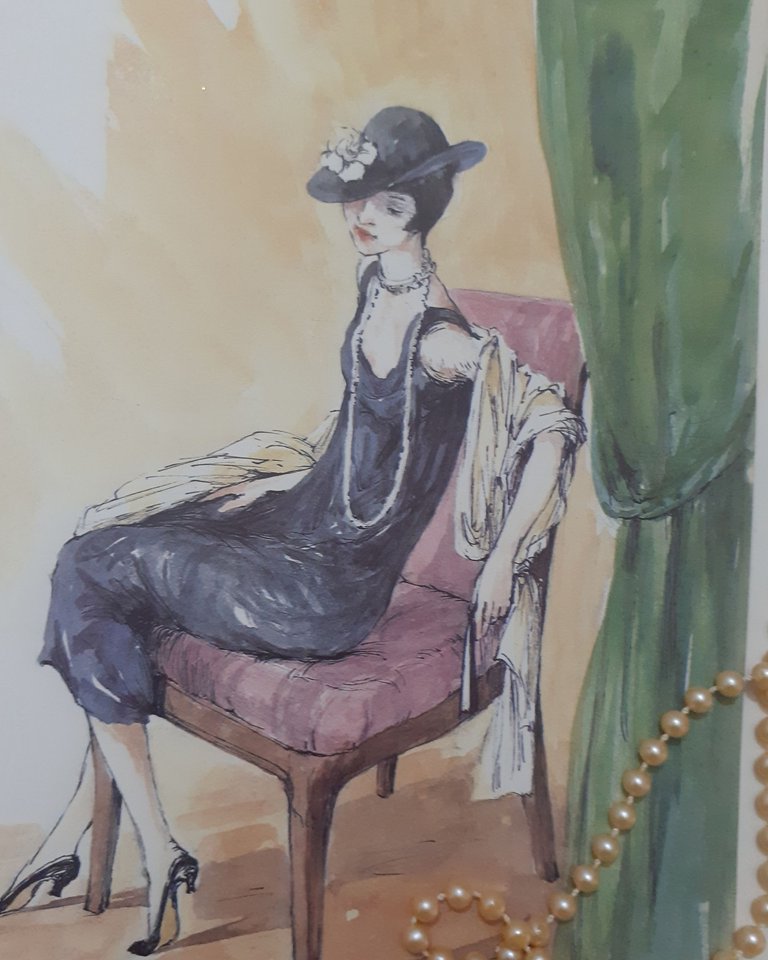
The writer describes not only the Parisian landscape, but also the Caracas of that colonial era, as well as invites us to recreate with her accurate description of each of the characters that accompany Iphigenia in this beautiful and naive story that was captured in that old and forgotten diary.
I give her ⭐⭐⭐⭐⭐ stars I have lived with every one that era of the red roofs, that quiet, controlled and unpredictable life of those young girls of high society, that gap between the upper, middle and lower classes where everyone tried to climb and position themselves in that great phenomenon called society, where a young rebel would never fit in.
! [Spanish]
Ifigenia. Mi libro para el mes de la mujer
Precisamente en este mes de la mujer me he dedicado un libro muy especial para mí por ser de una escritora venezolana, Teresa de la Parra, su primera novela Ifigenia la cuál me ha enganchado.
Desde el año pasado tengo conmigo una hermosa colección de libros de está mujer escritora, quien me ha cautivado con muchas de sus obras y entre estás se encuentra está novela que nos hace vivir desde la esencia de su pluma fresca y sutil, la vida de esta joven a través de su diario.
Está joven llamada Ifigenia nos deja conocer de manera sincera como realmente era su vida fastidiada por las reglas sociales y familiares que le impedían realmente ser, por miedo al repudió y al destierro familiar al no cumplir con sus deseos de ser una jovencita de la alta sociedad.
Ella nos habla del cambio brutal que padeció al regresar de París dónde solía vivir plena y libre, gastando sus últimos centavos en collares de granate, perlas, paquetes de perfumes, zapatos, vestidos y sombreros, además de paseos solitarios por los hermosos corredores y bulevares de esa romantica ciudad.
Para vivir el fastidio infinito encierro y las miradas cotidianas a través de los ventanales de aquellas antiguas casas, dónde solo solía preparar dulces, regar las flores de aquel frondoso jardín y bordar, tareas que no avivan ni llenaban su vida, ni cada uno de sus días.
La verdad lo he leído en un día, pero lo que más he disfrutado a sido palpar sus páginas, además del olor particular de sus páginas amarillentas que expresan antigüedad en el libro y las ilustraciones tan detalladas que nos transportan a cada escena que nos presenta la escritora.
Mientras se lee cada página vamos detallando a parte de todo lo cotidiano y familiar de la época, la situación que vivia la mujer frente a la sociedad de principios de este siglo XX, dónde las estrictas normas sociales no les permitía expresar sus ideas y menos elegir su destino, no decidían que estudiar, que hacer o con quién casarse.
Ifigenia vive su vida con sus familiares directos ya que es huerfana de padres, conocio el amor a través de Gabriel y algo de mundo a través de aquella gran ventana, quizás con la esperanza de poder conseguir un novio.
Su gran fortuna y herencia mobiliaria había pasado a manos directas de su tío Eduardo, lo cuál la obligó a vivir puertas adentro de aquella antigua casa, dónde convivia con su abuela y las cuatro criadas, entre ellas si confidente la negra Gregoria.
Vivir el amor a distancia destruyó las iluciones de Ifigenia, trás saber que su amado Gabriel se había comprometido, su vida en aquella Caracas se habia frustrado, sin esperanzas de amor, libertad y felicidad.
Aquella ventana era para esta vivaz joven una vitrina de exhibición, era disfrutar del paisaje y esperar al mejor comprador, en este caso un hombre mayor, profesional quien pretendía de ella, una jovencita refinada, ruborizada, tímida, bonita, distinguida y bien educada, todo lo que le conviene ser a una mujer de esa época que pertenece a lo mejor de Caracas.
Ella tiene novio sin querer, un hombre que la conciente, envia flores y lujosos cofres llenos de dulces exquisitos de las mejores marcas, la cuida y además de eso le ha prohibido vestir escotada, lucir maquillaje y cortarse el cabello, leer sus novelas románticas, en fin dejar de ser ella una mujer sabía y bachillera.
Al final los primeros amores regresan y aquel beso perdido se había consumado, aún cuando su primer amor ya estaba casado por obligación sin ninguna afinidad y dónde ambos se habían dado cuenta, que el dinero no tenía peso frente al amor y la felicidad.
Esto los arrastraba a vivir una aventura llena de promesas y una huida de amor que al final, fue frustrada por la exigencia de verse casada, señora de su propia casa, al lado de un hombre que le ofrecía una vida segura, un apellido respetable, un patrimonio, una dignidad y una familia.
Esa respetabilidad llamada sociedad, familia, honor, religión, moral, deber, principios y convenciones de un sacrificio que ha dejado a Ifigenia inmóvil en el tiempo, con 18 años de vida, elegante, hermosa, educada, culta en aquella sociedad exigente, dónde ella solo necesitaba a un hombre para ser representada, mantenida y controlada.
Ifigenia no puede ser, ni hacer lo que desea y ha pesar de todo ha intentado no perder su esencia de mujer, está historia me encanta tiene drama familiar, social y romántico, no hay escenas subidas de tono, todo evoca a la época.
La escritora nos describe no solo el paisaje parisino, sino el caraqueño de aquella época colonial, al igual que nos invita a recrear con su descripción precisa a cada uno de los personajes que acompañan a Ifigenia en esta hermosa y ingenua historia que quedó plasmada en aquel viejo y olvidado diario.
Le doy ⭐⭐⭐⭐⭐ estrellas he vivido con cada esa época de los techos rojos, esa vida tranquila, controlada e impredecible de aquellas jovencitas de la alta sociedad, esa brecha entre la clase alta, media y baja dónde todos intentaban escalar y posicionarse en ese gran fenómeno llamado sociedad, dónde una joven rebelde no jamás encajaría.
Content and photographs by me edition Canva.
It seems like there are many awesome Venezuelan writers that I have yet to discover. When I read through some of the written words there, it sounds poetic.
Teresa de la Parra is a Venezuelan writer and novelist, a complex and suggestive woman who has written the most relevant Hispanic American literature in recent times.
really my friend this is a good news of your book women love. may God bless you with my heart. friend always be friend
Thank you
You are Wellcome
This book seems to highlight the plight of women everywhere, but particularly at our roots. To acknowledge these heart rotting aspects of participating in society is pure art, I can understand why this was a 5-star review for you!
I want to read it now too, added to my list hehe 💚